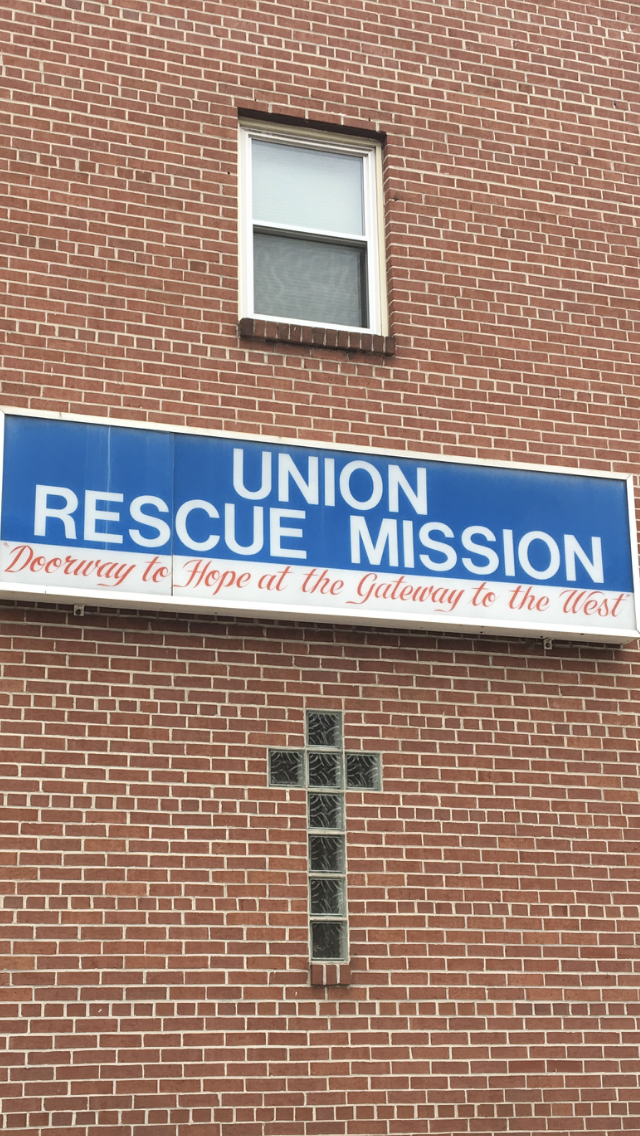CUMBERLAND, Maryland — It is just about 11:30 in the morning, and life is going on as normal in the crowded dining room of the Union Rescue Mission homeless shelter located along Queen City Pavement.
At least, their version of normal.
The sign outside the ancient red-brick building, once a notorious brothel for railroad travelers, reads: “Doorway to Hope at the Gateway to the West.”
Inside the shelter, which in warm weather can accommodate 62 men, women, and children, is at capacity, and lunch is being served by the staff, as well as the executive director, Pastor David Ziler.
In the cold weather, they can sleep 84, and Ziler says they are at capacity, a number they rarely hit.
“I think people are just kind of freaked out a little bit right now. So, the guys who would normally sleep out in tents, they’re all of a sudden seeking refuge. And so, we’re not used to seeing these numbers,” says Ziler. “We’ve also seen a spike in need for baby formula and diapers, and more people are coming in for our meals,” he said of the areas with people who are not in need of shelter, just in need.

Today, they served 200. They did that yesterday and the day before. They’ll also be able to do it day after day, largely thanks to their local community that has continued to donate food and necessities, even when social media shows evidence of society on the brink of violence over hoarding toilet paper.
“Even the local restaurants stepped up the moment they were ordered to shutter and donated all of their food and perishables for our meals,” he explained.
Off in the distance, the long-long-short-long train whistle can be heard. Ziler’s facility is adjacent to Cumberland’s Amtrak Station and CSX lines; the whistle is one of the few reminders commerce in this country is finding its way to all points west.
The streets of this city located along the North Branch of Potomac River, like cities and towns across the country, are empty. The strain seems harder in this Appalachian town that was once the center of America’s push west, the hub for the country’s railroads, the state’s second-largest city, and a booming outpost on the original National Pike.
While the rest of the country temporarily grapples with isolation and detachment from regular society, many here have been gradually isolating and detaching as technology, automation, and trade deals have moved former industry giants away from Cumberland long ago.
“The Union Rescue Mission is an independent nonprofit that is 100% faith-funded, and we meets all the basic needs for the homeless in the area,” he said.
That includes making sure that the population that inhabits the facility is checked for the coronavirus as robustly as possible in their partnership with UPMC Western Maryland Hospital, which runs a clinic at their facility.
“The issue with the homeless population is these guys are all together all the time. So if one person gets it, it’s going to run pretty quick. So that’s what we’re waiting for, watching for, and praying doesn’t happen,” he explains.
In the meantime, they are checking everyone coming in and out for temperatures, dry coughs, and any kind of respiratory issues.
“The issue we’re going to have, which we haven’t hit yet, is isolation because honestly, we are a homeless shelter. We don’t have the space to isolate. So even if we find somebody that’s homeless, if they’re not meeting the criteria to be hospitalized, how do you isolate a homeless person? Right? You can’t just say, go home,” he said.
He and his staff of eight started coming up with solutions for what to do when that ultimately happens Tuesday.
“We just started brainstorming: Are there churches available that we could use their gymnasiums for isolation? We have started asking around the faith-based community to fill this need as to how you isolate a homeless person?” he explained.
Ziler said he has never looked to the government to solve problems. He is, like he does every day, relying on his faith to soldier through when he feels the strain. “I’ve never believed that government’s responsible for individuals. The government’s responsible for the ever-arching protection of our country. It’s the church and the community that’s responsible for individual needs. And that’s why we’re here, because we believe that to the core value,” he said.
“I don’t blame anybody. Bad times, just like good times, are part of life. We’re just doing what we’re supposed to do, which is help each other. And we believe that it’s supposed to be Providence. It’s not supposed to be just overarching government. It comes in, and it tells us how to protect ourselves and take care of each other.”

